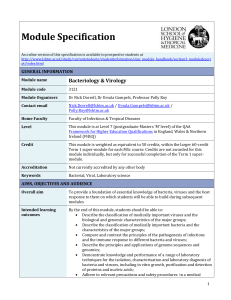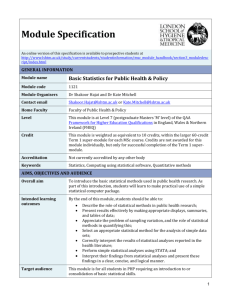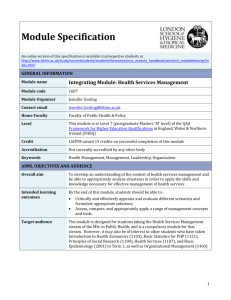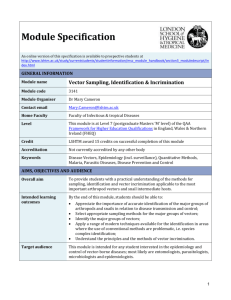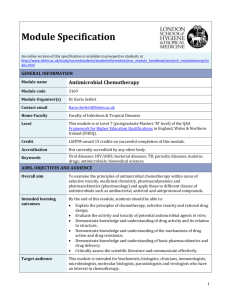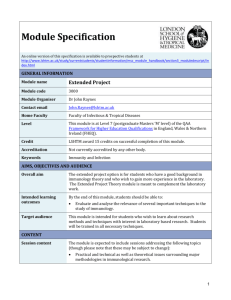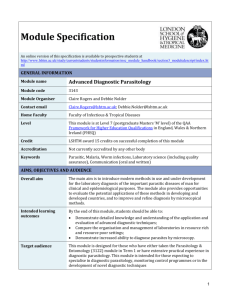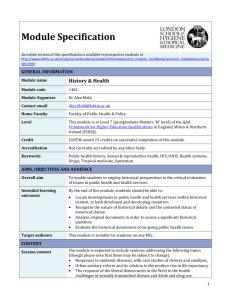3187 Clinical Virology Module Specification
advertisement
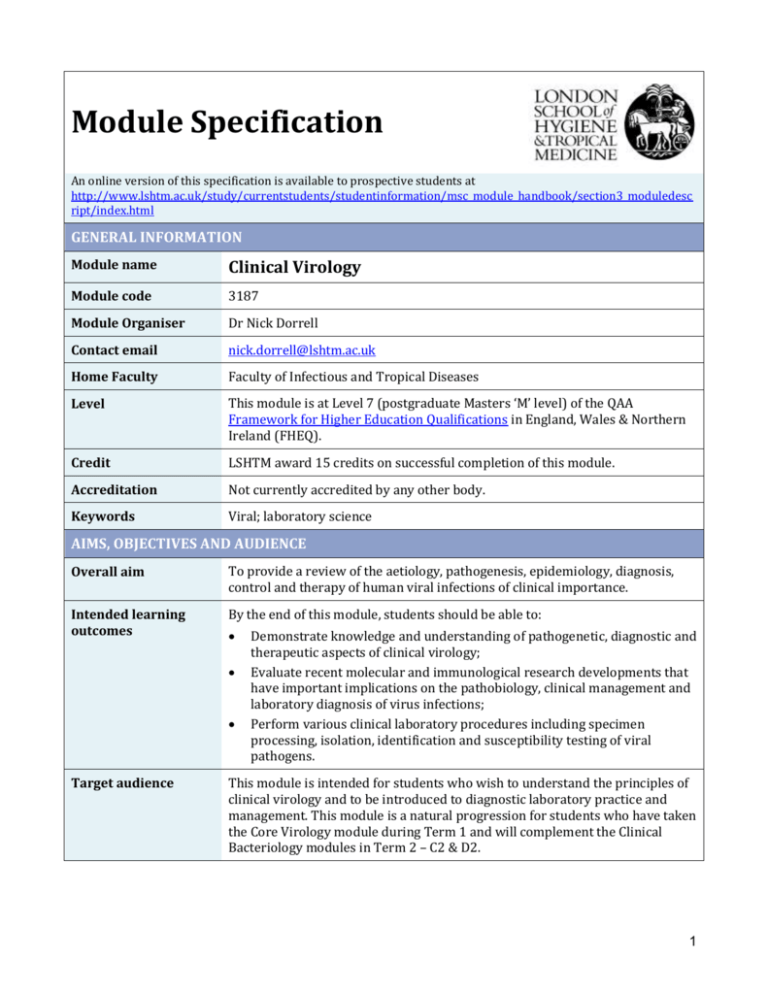
Module Specification An online version of this specification is available to prospective students at http://www.lshtm.ac.uk/study/currentstudents/studentinformation/msc_module_handbook/section3_moduledesc ript/index.html GENERAL INFORMATION Module name Clinical Virology Module code 3187 Module Organiser Dr Nick Dorrell Contact email nick.dorrell@lshtm.ac.uk Home Faculty Faculty of Infectious and Tropical Diseases Level This module is at Level 7 (postgraduate Masters ‘M’ level) of the QAA Framework for Higher Education Qualifications in England, Wales & Northern Ireland (FHEQ). Credit LSHTM award 15 credits on successful completion of this module. Accreditation Not currently accredited by any other body. Keywords Viral; laboratory science AIMS, OBJECTIVES AND AUDIENCE Overall aim To provide a review of the aetiology, pathogenesis, epidemiology, diagnosis, control and therapy of human viral infections of clinical importance. Intended learning outcomes By the end of this module, students should be able to: Target audience Demonstrate knowledge and understanding of pathogenetic, diagnostic and therapeutic aspects of clinical virology; Evaluate recent molecular and immunological research developments that have important implications on the pathobiology, clinical management and laboratory diagnosis of virus infections; Perform various clinical laboratory procedures including specimen processing, isolation, identification and susceptibility testing of viral pathogens. This module is intended for students who wish to understand the principles of clinical virology and to be introduced to diagnostic laboratory practice and management. This module is a natural progression for students who have taken the Core Virology module during Term 1 and will complement the Clinical Bacteriology modules in Term 2 – C2 & D2. 1 CONTENT Session content The module is expected to include sessions addressing the following topics (though please note that these may be subject to change): Lectures will cover an introduction to diagnostic virology, the application of NAATS in virology, Quality Assurance and Health & Safety issues, gastrointestinal infections, STIs (not including HIV or hepatitis), congenital and paediatric infections, childhood infections, respiratory infections, HIV diagnosis & management, hepatitis, vital infections of immunocompromised patients, travel-associated viral infections and emerging viral infections. Practical sessions will cover Enzyme-ImmunoAssay (EIA), serology and electron microscopy applications for diagnosis, PCR-based applications for diagnosis, an Infection Control exercise and applications of immunefluorescence for diagnostics. There will also be a day visit to the Department of Medical Microbiology at St George’s Hospital and an afternoon of Clinical Case Presentations from clinicians from St George’s Hospital. TEACHING, LEARNING AND ASSESSMENT Study resources provided or required All materials and equipment for the practical sessions will be provided. Detailed handouts for lectures will also be provided. Teaching and learning methods The module consists of lectures and practical sessions, plus an afternoon of Clinical Case Presentations from clinicians from St George’s Hospital. Assessment details Students will sit a two hour written examination covering all aspects of the module. The written examination will consist of short notes questions. For students who are required to re-sit, or granted a deferral or new attempt, the task will be a coursework assessment consisting of 4 short essay questions. Assessment dates Assessments will take place during Week 5 of the C1 slot. For students who are required to re-sit, or granted a deferral or new attempt, the coursework assessment deadline will be the standard Schoolrecommended date in mid/late September 2016; short essay titles will be provided in early September. Language of study and assessment English (please see ‘English language requirements’ below regarding the standard required for entry). TIMING AND MODE OF STUDY Duration The module runs for 5 weeks at 2.5 days per week; this module runs between Monday morning and Wednesday lunchtime. Dates For 2015-16, the module will start on Monday 11 January 2016 and finish on Wednesday 10 February 2016. Timetable slot The module runs in LSHTM timetable slot C1. Mode of Study The module is taught face-to-face in London. Both full-time and part-time students follow the same schedule. For full-time students, other LSHTM modules are available in the other half of the week for the C and D slots. 2 Learning time The notional learning time for the module totals 150 hours, consisting of: Contact time ≈ 48 hours Directed self-study ≈ 26 hours Self-directed learning ≈ 26 hours Assessment, review and revision ≈ 50 hours APPLICATION, ADMISSION AND FEES Pre-requisites This module is a natural progression for students who have taken the Core Virology module during the autumn term. Students who have not taken this module should be aware of the large practical component of this module that builds on areas covered during the Core Virology course. English language requirements A strong command of the English language is necessary to benefit from studying the module. Applicants whose first language is not English or whose prior university studies have not been conducted wholly in English must fulfil LSHTM’s English language requirements, with an acceptable score in an approved test taken in the two years prior to entry. Applicants may be asked to take a test even if the standard conditions have been met. Student numbers Student numbers are typically 20 to 30 per year; numbers will be capped at 30 students due to available spaces in the LSHTM Microbiology teaching laboratory. Student selection Preference will be given to LSHTM MSc Medical Microbiology and Molecular Biology of Infectious Diseases students who studied the Core Virology module in Term 1. Other applicants meeting the entry criteria will usually be offered a place in the order applications are received, until any cap on numbers is reached. Applicants may be placed on a waiting list and given priority the next time the module is run. Fees For registered LSHTM MSc students, fees for the module are included within MSc fees (given on individual course prospectus pages). If registering specifically for this module, as a stand-alone short course, individual module fees will apply. Tuition fees must be paid in full before commencing the module, or by any fee deadline set by the Registry. Scholarships Scholarships are not available for individual modules. Some potential sources of funding are detailed on the LSHTM website. Admission deadlines For 2015-16: For registered LSHTM MSc students, the module choice deadline (for Term 2 and 3 modules) is Friday 20 November 2015. If registering specifically for this module, applications may be made at any time but, as places are limited, early application is recommended. All applications should be submitted by, at the latest, 8 weeks prior to the start of the module. Formal registration will take place on the morning of the first day of the module. 3 ABOUT THIS DOCUMENT This module specification applies for the academic year 2015-16 Last revised 10 June 2015 by Dr Nick Dorrell London School of Hygiene & Tropical Medicine, Keppel St., London WC1E 7HT. www.lshtm.ac.uk 4
